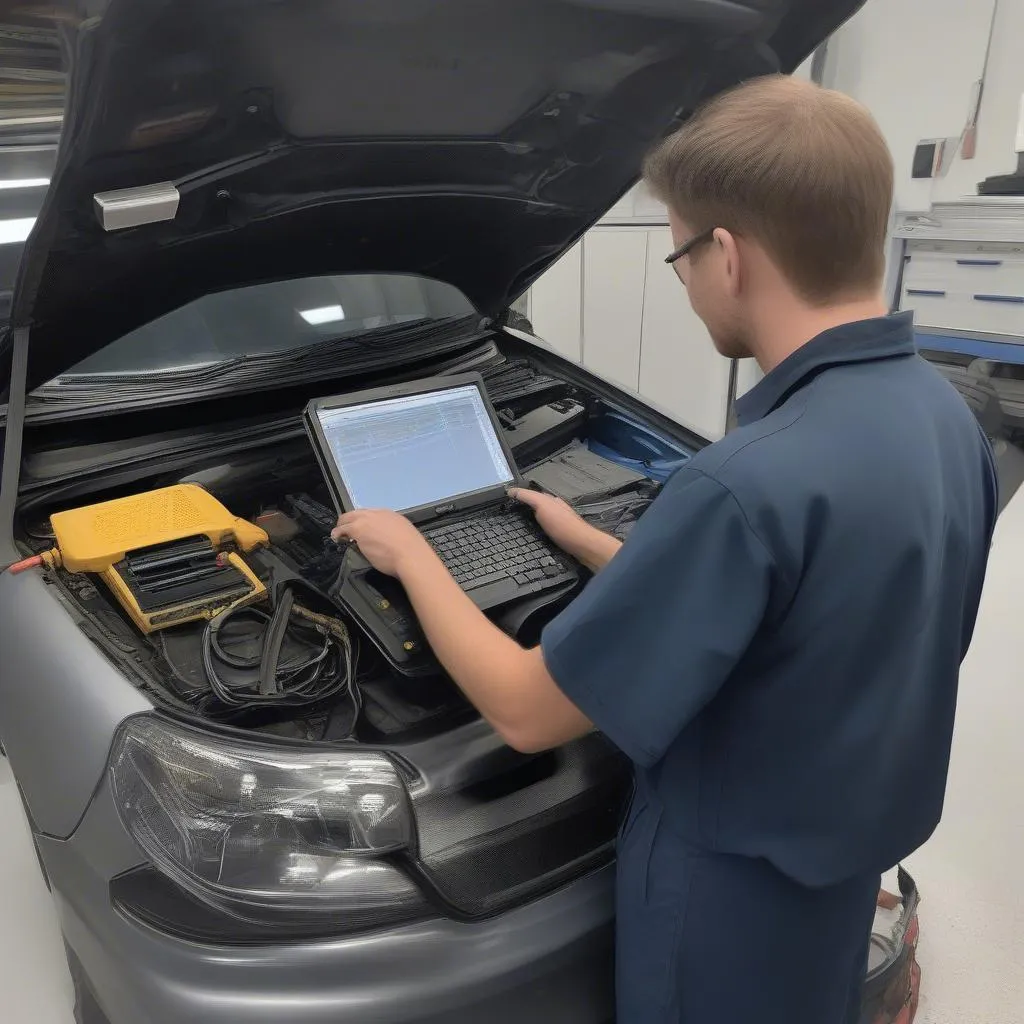Imagine you’re driving down a busy highway when suddenly, your car starts acting up. The engine sputters, the lights flicker, and you’re left stranded on the side of the road. What do you do? You pull over, check the dashboard for any warning lights, and hope for the best. But if you’re a seasoned mechanic, you’d probably reach for your trusty vehicle tester.
A vehicle tester, also known as an automotive diagnostic tool, is a device that helps mechanics and technicians diagnose problems with a vehicle’s electrical system and other components. These tools are essential for any professional mechanic, and they can be incredibly helpful for even the most amateur DIY enthusiasts.
What Is a Vehicle Tester and Why Is It Important?
A vehicle tester is a diagnostic tool that connects to your vehicle’s onboard computer system to read fault codes, perform live data readings, and access other valuable information. It allows mechanics to diagnose issues more efficiently, saving time and money.
Understanding the Importance of a Vehicle Tester from a Mechanic’s Perspective:
As a seasoned mechanic, I can tell you that a vehicle tester is an absolute game changer. It’s like having a crystal ball that allows you to see into the heart of your vehicle’s electrical system. No more guessing or relying on intuition. A vehicle tester provides concrete data and insights that help pinpoint the root cause of a problem.
Think of it this way: a vehicle tester can tell you if a sensor is malfunctioning, if there’s a short circuit in the wiring, or if a specific component is failing. It eliminates the need to replace parts haphazardly, saving you time, money, and frustration.
Vehicle Testers – A Technical Perspective:
From a technical perspective, vehicle testers utilize sophisticated technology to communicate with a vehicle’s electronic control units (ECUs). They transmit and receive data through various protocols, including OBD-II, CAN, and J1939, to identify and interpret error codes. These tools often include a comprehensive library of vehicle data, allowing mechanics to access detailed information about specific models and components.
The Economic Impact of Vehicle Testers:
Beyond their technical benefits, vehicle testers also have a significant economic impact on the automotive industry. They help save time and resources by streamlining the diagnostic process, reducing the need for unnecessary repairs and minimizing downtime. Imagine a world where mechanics had to rely on guesswork and trial and error. The costs and inconvenience would be astronomical.
Answering Your Questions:
Now, let’s dive into some of the most common questions about vehicle testers.
What are the Different Types of Vehicle Testers?
There are several different types of vehicle testers available, each tailored for specific applications:
- OBD-II Scanners: These are the most basic type of vehicle tester, primarily used for reading and clearing trouble codes. They are affordable and widely available, making them popular for DIY enthusiasts.
- Multi-Function Scanners: These tools offer a wider range of functionality, including live data monitoring, component testing, and advanced diagnostics. They are often preferred by professional mechanics.
- Dealer-Level Scanners: These are specialized tools designed for use by authorized dealerships and provide the most extensive functionality, including access to manufacturer-specific programming and calibration tools.
What Features Should I Look for in a Vehicle Tester?
When choosing a vehicle tester, consider the following features:
- Compatibility: Make sure the tester is compatible with your vehicle’s make, model, and year.
- Functionality: Decide on the level of functionality you need, based on your skill level and intended use.
- User Interface: Look for a tool with an intuitive and user-friendly interface, making it easy to navigate and understand.
- Software Updates: Choose a tester that offers regular software updates to ensure compatibility with newer vehicles and diagnostic protocols.
How Can I Use a Vehicle Tester?
Using a vehicle tester is generally straightforward:
- Connect the tester to your vehicle’s OBD-II port, typically found under the dashboard.
- Turn the ignition on, but do not start the engine.
- Follow the instructions provided with your tester.
- Select the appropriate vehicle make, model, and year.
- The tester will then display various diagnostic information, such as trouble codes, live data, and other relevant data.
Can I Use a Vehicle Tester Myself?
While using a vehicle tester can be relatively easy, it’s important to understand that performing advanced diagnostics requires knowledge and experience. If you’re not familiar with automotive electrical systems, it’s best to seek help from a professional mechanic.
Case Studies and Expert Opinions:
Case Study: “The Case of the Misfiring Cylinder”
Let’s consider a real-world scenario. A customer brings their vehicle to your shop complaining of a misfiring cylinder. You connect your vehicle tester and discover a fault code related to a faulty ignition coil. By accessing live data, you confirm that the ignition coil is indeed malfunctioning. Armed with this information, you quickly replace the coil and the problem is solved.
Expert Opinion: “Vehicle Testers are Essential Tools”
According to Dr. Thomas Miller, a renowned automotive engineer, “Vehicle testers have revolutionized the automotive repair industry. They have drastically reduced diagnostic time, increased accuracy, and improved efficiency.” He emphasizes the importance of using reliable and up-to-date tools to ensure proper diagnosis and repair.
Commonly Asked Questions:
How often should I use a vehicle tester?
It’s a good practice to use a vehicle tester regularly, especially if you notice any unusual symptoms or warning lights on your dashboard.
What are some alternative diagnostic tools for vehicle testers?
While vehicle testers are highly effective, there are other diagnostic tools available, such as:
- Multimeters: These tools are essential for testing electrical circuits and measuring voltage, current, and resistance.
- Oscilloscope: This tool allows you to visualize electrical signals and can be useful for diagnosing problems with sensors and other electrical components.
Where can I find more information about vehicle testers?
You can find a wealth of information about vehicle testers online, including forums, articles, and manufacturer websites. You can also consult with your local auto parts store or an experienced mechanic.
Frequently Asked Questions:
What’s the difference between a vehicle tester and a scan tool?
While the terms “vehicle tester” and “scan tool” are often used interchangeably, there’s a subtle difference. A scan tool is a more general term that refers to any tool used to read and interpret data from a vehicle’s computer. A vehicle tester is a more specific term that encompasses a wider range of functionality, including live data monitoring, component testing, and advanced diagnostics.
What are some popular brands of vehicle testers?
Some popular brands of vehicle testers include Autel, Launch, Foxwell, and BlueDriver. These brands offer a variety of testers to suit different needs and budgets.
Can a vehicle tester help with transmission problems?
While vehicle testers are primarily used for diagnosing electrical issues, they can also provide some insights into transmission problems by reading fault codes and monitoring live data.
Conclusion:
Vehicle testers are indispensable tools for any automotive professional or serious DIY enthusiast. They provide valuable insights into a vehicle’s electrical system, allowing for accurate diagnoses and efficient repairs. If you’re looking to save time, money, and frustration, a vehicle tester should be a top priority.
Feel free to leave a comment below if you have any questions or share your experiences with using a vehicle tester. And remember, if you need assistance with any automotive diagnostic tools or software, don’t hesitate to contact us!
 OBD-II Scan Tool
OBD-II Scan Tool
 Multi-Function Scanner
Multi-Function Scanner